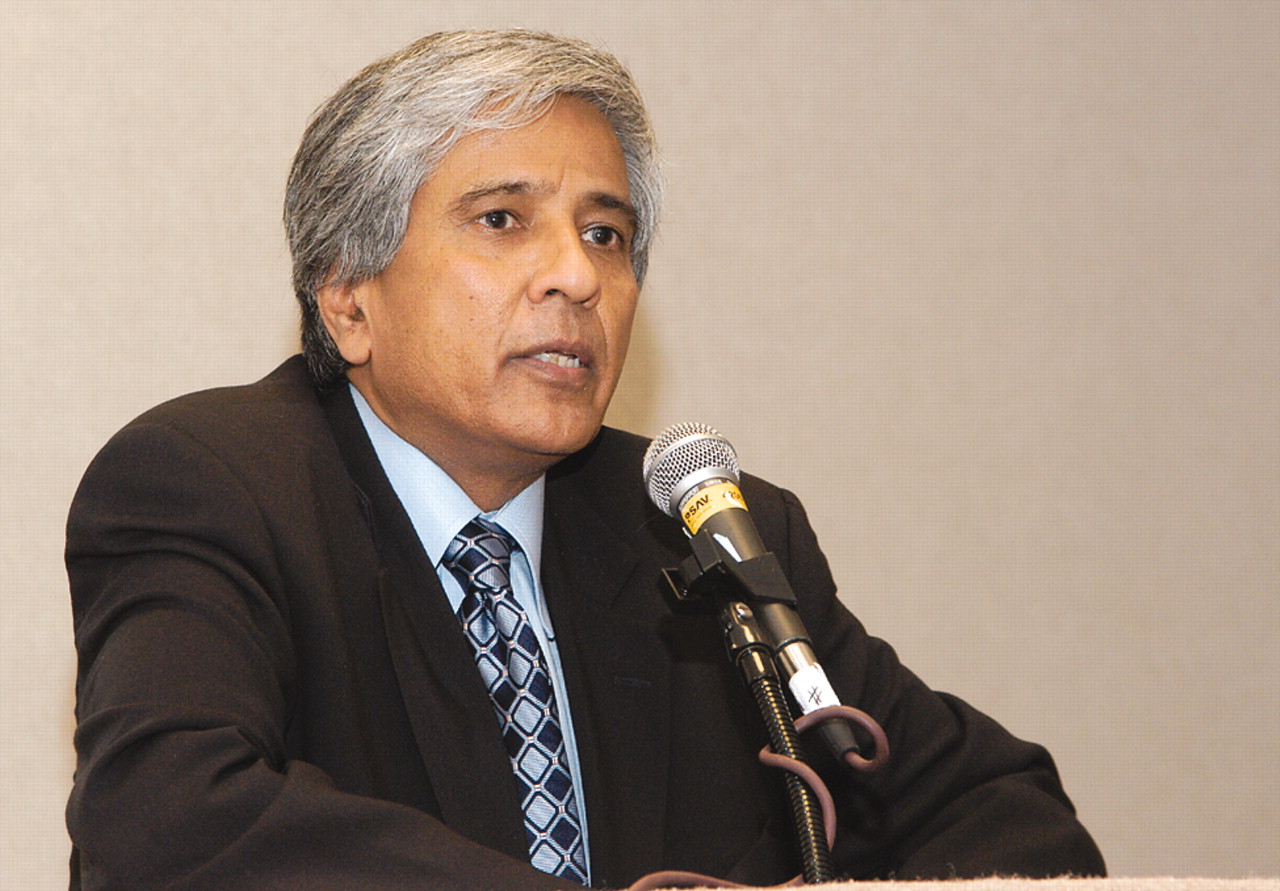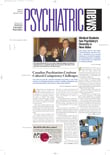Is a dialogue possible between psychoanalysis, with its explicitly Western language and assumptions, and the Eastern cultures of the world? The chances are good for at least a start if the psychoanalyst doing the talking is Salman Akhtar, M.D.
In his lecture last month at APA's Institute on Psychiatric Services (IPS) in Atlanta titled “Psychoanalysis and Eastern Cultures: Adversaries or Allies?” Akhtar held out the promise of something like a rapprochement between the ancient cultures of the East and the depth psychology of the West.
Akhtar received APA's Kun-Po Soo Award, which recognizes an individual who has made significant contributions toward understanding the impact and import of Asian cultural heritage in areas relevant to psychiatry.
In an address salted with trademark good humor, wit, and poetry, Akhtar offered a critique of tendencies within psychoanalysis, and within the cultures of the East, that have stymied communication between the two.
In particular he cited an early, antiquated emphasis within psychoanalysis on the body and anatomy as masters of the mind, an emphasis that has caused it to speak in a language that falls on Eastern ears as lewd and obscene. Moreover, he said the effort to impose developmental theories derived from empirical observations in narrowly Western contexts on non-Western subjects can have only disastrous results.
Akhtar said certain Eastern traits that have been considered inimical to psychoanalysis and to the Western spirit generally—silence, inactivity, and acceptance of death as part of life—are already being incorporated into, and enriching, psychoanalytic theory and practice.
In turn, Akhtar said Eastern cultures should welcome Freud's admonition to not be afraid of one's thoughts and should relinquish the propensity to seek violent retribution against those who dare to say or write what is considered unthinkable or sacrilegious. He also said Eastern societies need to develop a vocabulary for talking about sexual and anatomical functions that is not considered obscene by their own people.
“I think there is a lot of scope for dialogue and enrichment, provided the Eastern peoples give up their defensiveness and provided the Western people give up their colonial tendencies,” he told his audience.
Akhtar may be especially suited to open a discourse between East and West. Born in Lucknow, India, in 1946, he came to the United States in 1973. He trained in psychiatry at the University of Medicine and Dentistry of New Jersey in Newark, the University of Virginia in Charlottesville, and the Philadelphia Psychoanalytic Institute. Today, he is a lecturer in psychiatry at Harvard Medical School, a professor of psychiatry at Jefferson Medical College, and a training and supervising analyst at the Philadelphia Psychoanalytic Institute.
Akhtar is the author of numerous scientific papers and books, as well as six volumes of poetry. He is the recipient of the Margaret Mahler Literature Prize and the American Psychoanalytic Association's Edith Sabshin Award. He is also a scholar in residence at Interact Theater Company in Philadelphia.
Akhtar said the Kun-Po Soo Award and lecture is itself a sign of a developing dialogue within psychiatry between East and West. And he added that psychoanalysis is today more willing to challenge some of its own notions, once considered sacrosanct, making the field far better prepared to develop an international language and perspective.
“Things are much more open today,” he said. “This talk could not have been given by a psychoanalyst some years ago.”
Akhtar noted that at least four separate and distinct concepts are implied in psychoanalysis: a theory of mental functioning, models of development that vary depending on the school of psychoanalysis to which one adheres, concepts of psychopathology, and the technique and practice of analysis with a patient.
Of these, only the theory of mental functioning—conscious and unconscious forces, projection, internalization, regression, among all the numerous other terms for how the mind operates—is universally applicable across cultures and ethnic groups.
The other aspects of psychoanalysis are culture bound and encounter difficulty when an attempt is made to transport them across ethnic and cultural boundaries. This is especially true of developmental models, which have been all but uniformly developed from empirical observation in Western settings, Akhtar said.
He cited as an instance the developmental model of separation and individuation espoused by Margaret Mahler, which he noted was derived largely from observation of white, upper-class children in Manhattan. Had she moved instead to rural Japan or India, “Margaret Mahler's theory and observations would be very different,” he said.
“To take a theory developed from the observation of little white children from upper-middle-class Manhattan and generalize to all the world is a problem,” he said. “If we try to transport lock, stock, and barrel developmental models evolved from the empirical observation of one set of situations to another set of situations, we are going to create problems. And from that we will create injurious models of psychopathology.”
Concepts such as regression or the need for transitional objects, as well as corresponding formulations about what constitutes normal or abnormal behavior with regard to these and other developmental concepts, are apt to be very different from one culture to the next, Akhtar said.
Even the pace at which a child consolidates gender identity may be influenced by such culturally idiosyncratic factors as the internal structure of the language in which a child is raised—for instance, whether the language employs masculine and feminine verb forms.
“These developmental theories are not God-given facts,” Akhtar said, “but hypotheses evolved from certain observations that need to be further tuned and modified without pathologizing alternate ways of responding.”
Moreover, much of the language of psychoanalysis—drawing on what Akhtar called antiquated notions about the primacy of the body and anatomy in psychoanalytic thought—is received as lewd and offensive in Eastern societies, where the native language often lacks terms that are not considered obscene for private anatomy and sexual functions.
He cited as typical a Western academic interpretation of an ancient mythical tale about the god Shiva and his consort, Parvati, that relied on such concepts as Oedipal desire, erotic jealousy, and castration anxiety and that succeeded mainly in infuriating Eastern readers.
In its place Akhtar offered his own interpretation, drawing on more universal emotional motivations and longings understood within the specific cultural context of the story. “When we use psychoanalysis in antiquated, bodily oriented ways across cultures about sacred objects, with a language that is not transferable except in lewd terms, we lose our audience and we hurt people,” Akhtar said. ▪

